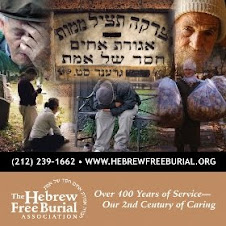"You can't take it with you." That phrase is most commonly associated with money. However, it is becoming clearer to me that is also refers to one's history. When we die, so do our stories, our ideas, our memories. Now, many are fortunate enough to be survived by friends and loved ones. Many of the stories are known and the tales are retold from generation to generation. Family trees are drawn up and people are remembered. When the memories live on, the person lives on.
What's tragic is when someone isn't survived by friends or family. Then, the memories die too. Unfortunately, more often than not, the cases that come in to the Hebrew Free Burial Association have no relatives. The person's history is nonexistent. Who is this person? What did she do? Where did she live? What were her parents names? Tragically, the person is forgotten.
There is a solution for us with family to ensure that our family histories are remembered. Tell it over. On Passover, the Mitzvah of retelling the story of the exodus from Egypt is formulated, V'Higadita L'Bincha, and you should tell it over to your children. Record our stories. Write them down. Relate them to friends and family. This is part of the beauty of the Steven Spielberg's Shoah Foundation. By recording the stories of Holocaust Survivors, it is ensured that they're stories will live on, even when they do not.
Thursday, January 17, 2008
Gone and forgotten
Subscribe to:
Post Comments (Atom)


No comments:
Post a Comment